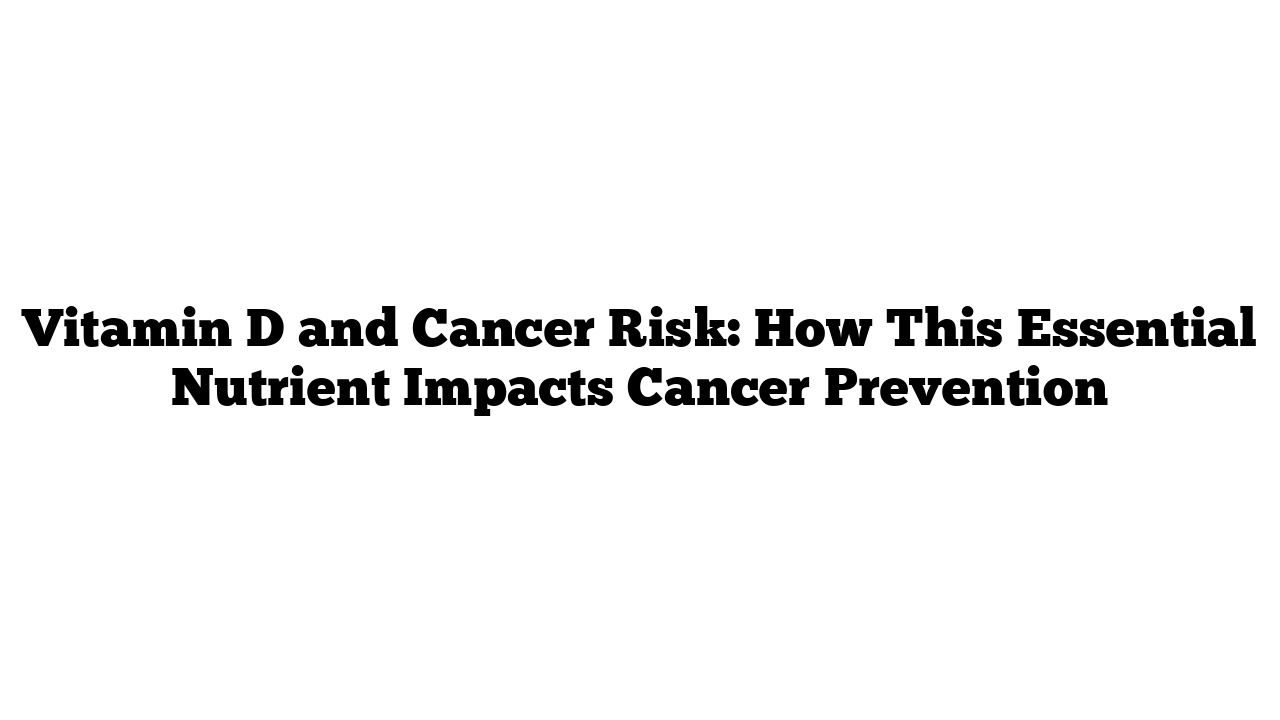Vitamin D and Cancer Prevention | Essential Role in Reducing Cancer Risk and Supporting Treatment
Understanding the Link Between Vitamin D and Cancer
Vitamin D plays a critical role in supporting the immune system, regulating cellular functions, and even influencing the body’s response to cancer. Studies suggest that cancer thrives in an environment with low vitamin D, underscoring the importance of adequate levels for cancer prevention.
1. Vitamin D’s Cancer-Preventive Mechanisms
- Cell Repair and Apoptosis: One of Vitamin D’s primary functions is to help damaged cells self-destruct, a process called apoptosis. This is crucial in preventing damaged cells from transforming into cancerous ones.
- Regulation of Cell Growth: Vitamin D helps keep cell growth in check. Unregulated growth is a hallmark of tumors, so adequate vitamin D helps prevent rapid and uncontrolled cell division.
- Anti-Inflammatory Properties: Chronic inflammation is often linked to cancer development. Vitamin D naturally reduces inflammation, making it harder for cancer cells to establish themselves.
2. Vitamin D’s Role in Cancer Treatment Support
For those diagnosed with cancer, maintaining optimal vitamin D levels can provide additional benefits:
- Enhanced Immune Response: Vitamin D strengthens the immune system, which is vital for fighting off cancer cells.
- Support for Chemotherapy: Research has shown that Vitamin D may boost the effectiveness of certain cancer treatments.
- Improved Insulin Sensitivity: Vitamin D aids in insulin sensitivity, which may reduce cancer risk, as insulin resistance is linked with increased cancer susceptibility.
3. Cancer’s Impact on Vitamin D Levels
Cancer cells can alter their environment to prevent the body from absorbing vitamin D effectively. Tumors often create conditions of high acidity, inflammation, and low oxygen (hypoxia), all of which inhibit vitamin D absorption and activity. Moreover, some cancers produce a hormone that extracts calcium from bones, indirectly suppressing vitamin D.
4. Vitamin D Deficiency: Risk Beyond Cancer
Low vitamin D levels are common in various inflammatory and autoimmune diseases, such as tuberculosis, HIV, and osteoarthritis. Individuals with chronic inflammation or immune disorders may benefit from higher doses of vitamin D, as inflammation can impair the nutrient’s effectiveness.
5. Optimizing Vitamin D for Cancer Prevention
For optimal health, consider these suggestions for improving vitamin D absorption and effectiveness:
- Supplementation: High-dose vitamin D3 (10,000 to 50,000 IU per day) along with magnesium, K2, and zinc, under a healthcare provider’s guidance.
- Lifestyle Adjustments:
- Exercise: Regular, intense physical activity boosts vitamin D receptor activity.
- Diet: Low-carb, high-nutrient foods improve insulin sensitivity and can support vitamin D metabolism.
- Stress Management: Lowering stress decreases cortisol levels, which can improve vitamin D absorption.
6. Additional Nutrients and Habits to Enhance Vitamin D Absorption
- Magnesium: Essential for activating vitamin D.
- Omega-3 Fatty Acids: Found in fish oils, these anti-inflammatory fats support overall health.
- Curcumin and Resveratrol: Known for their anti-inflammatory and antioxidant effects.
- Probiotics: Support gut health, indirectly benefiting vitamin D absorption.
Final Thoughts
Vitamin D’s role in cancer prevention and support is profound, especially in its ability to regulate cell growth, reduce inflammation, and enhance immune function. While vitamin D alone cannot cure cancer, maintaining sufficient levels may improve health outcomes and provide a complementary benefit during treatment.
For more in-depth information on vitamin D and cancer prevention, visit medicaltimes.io.
